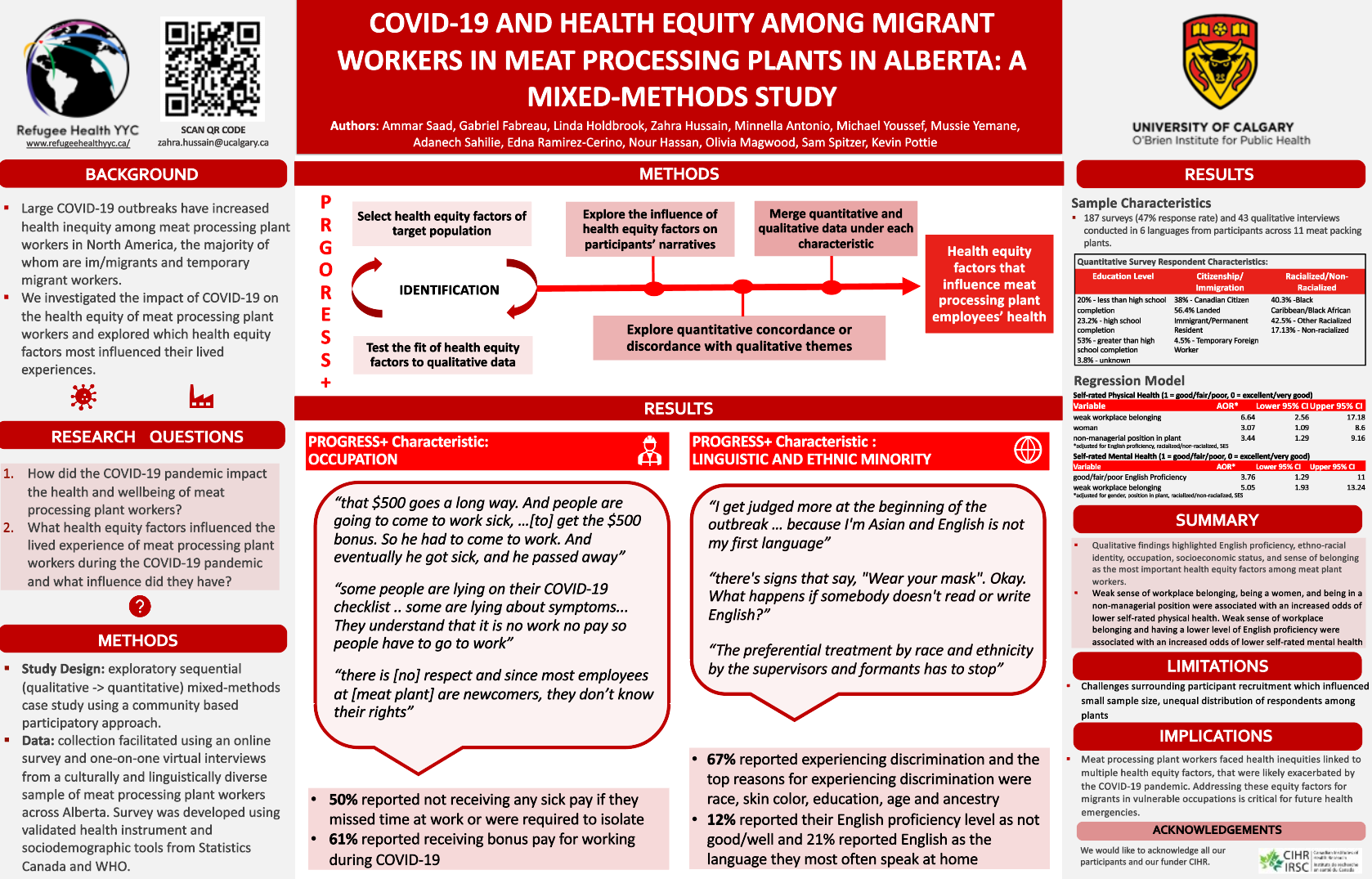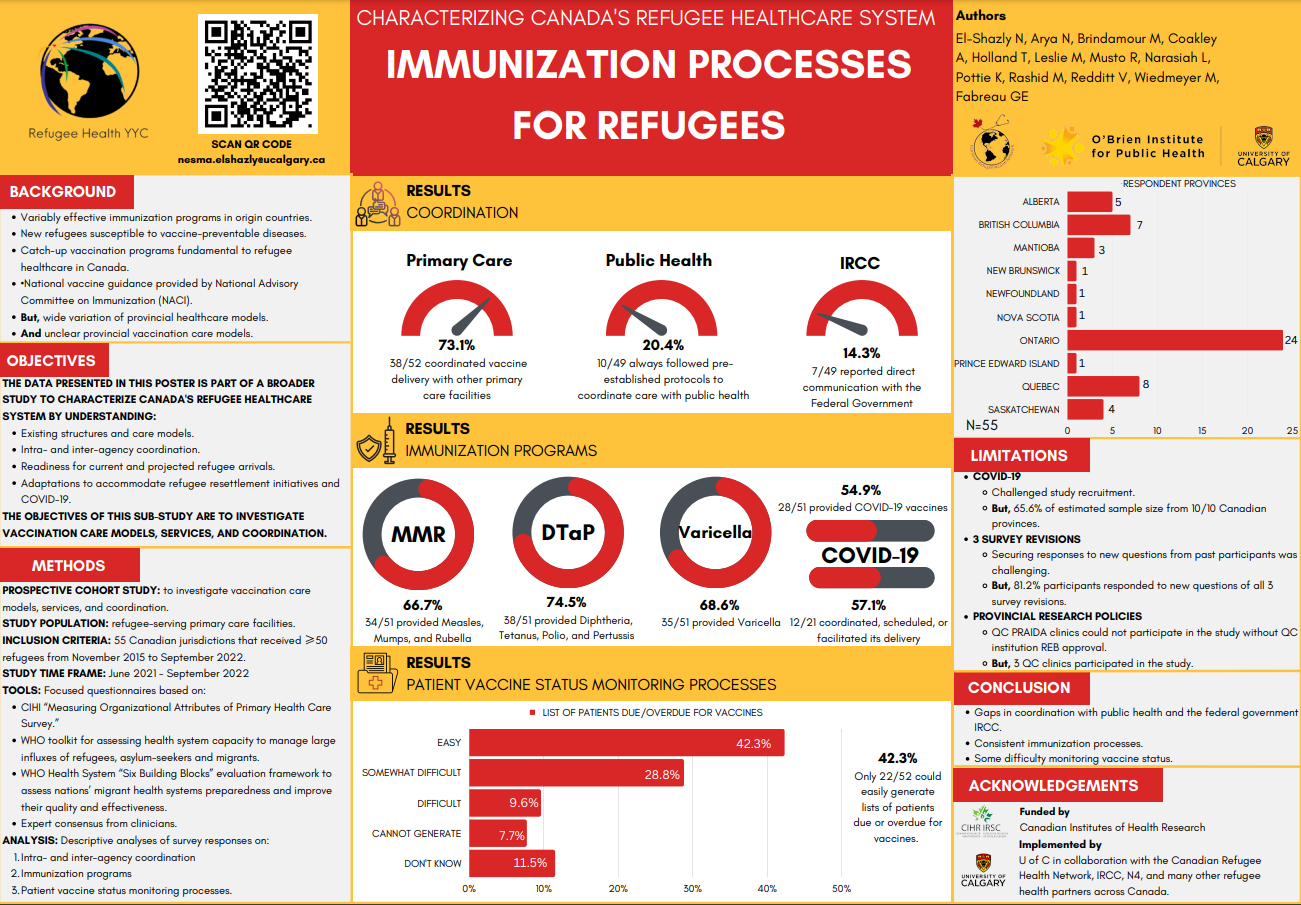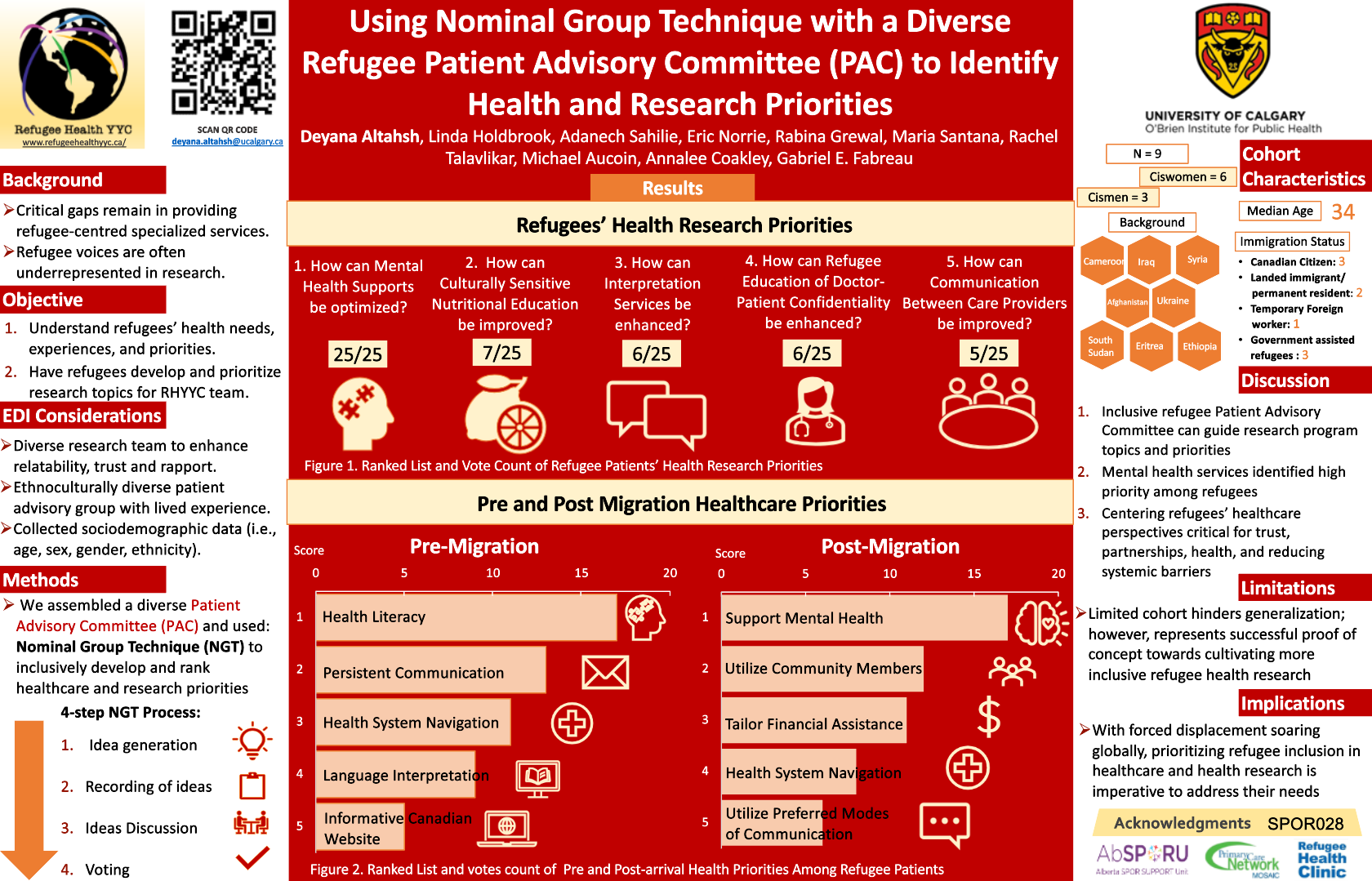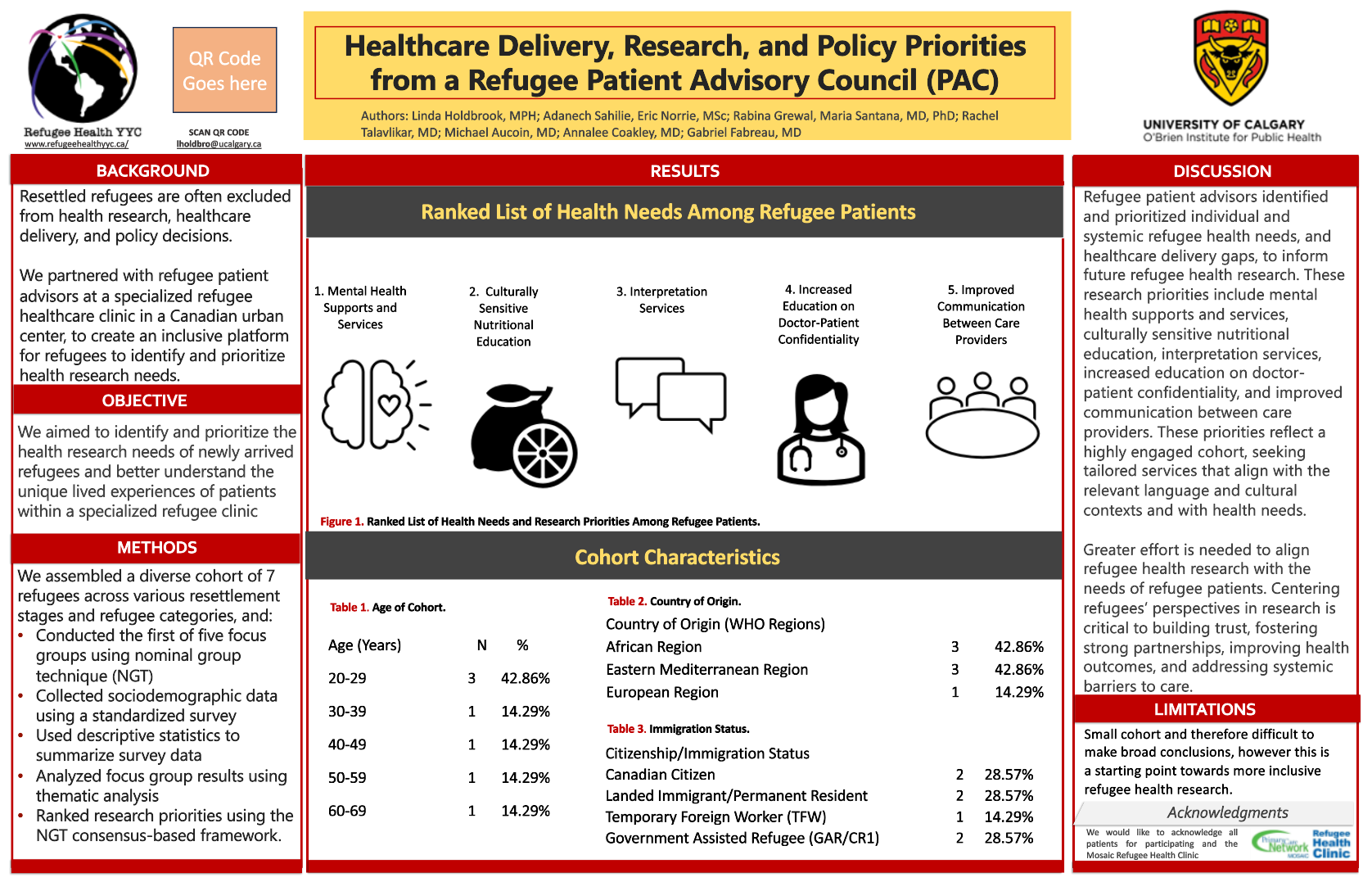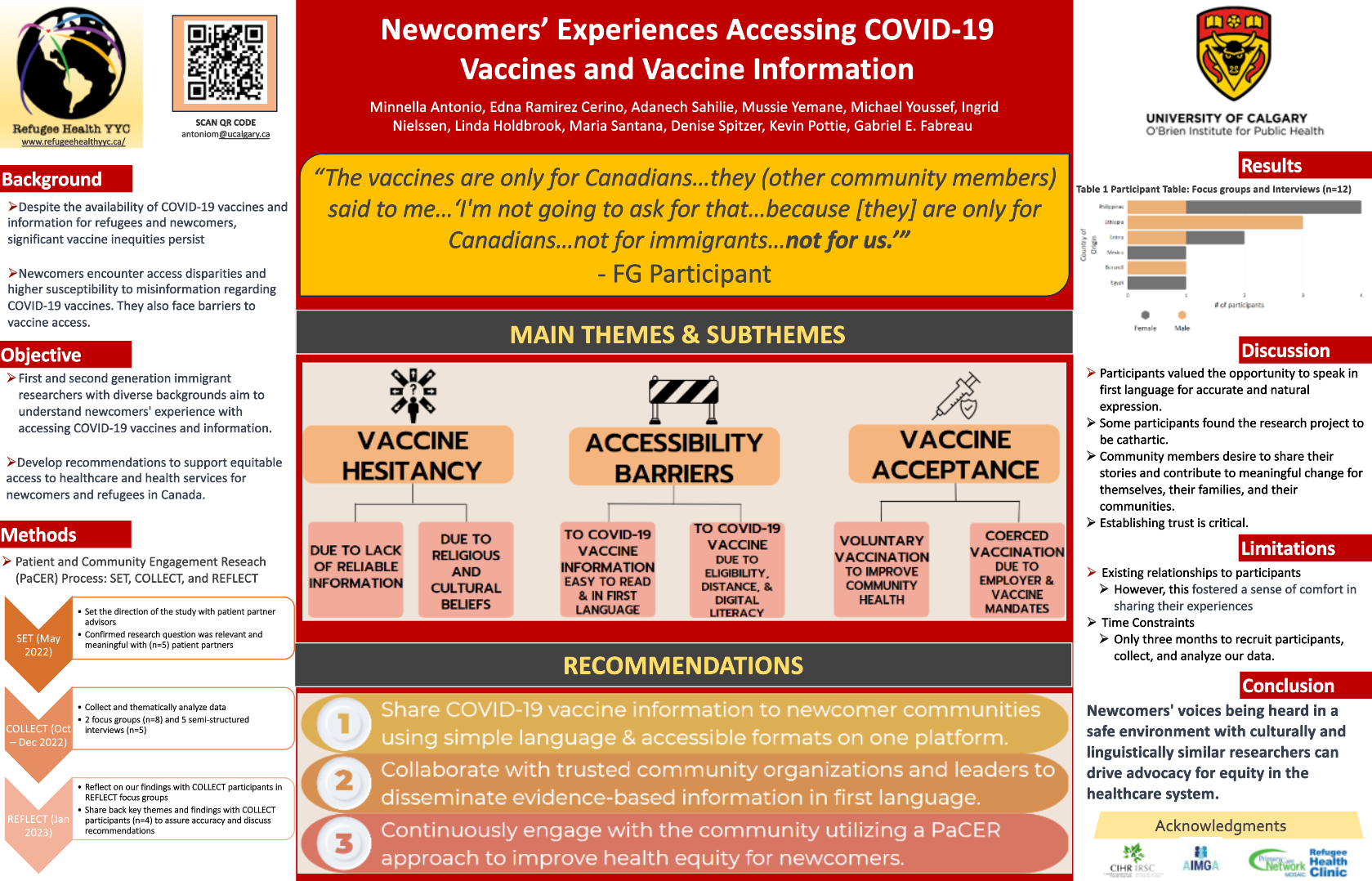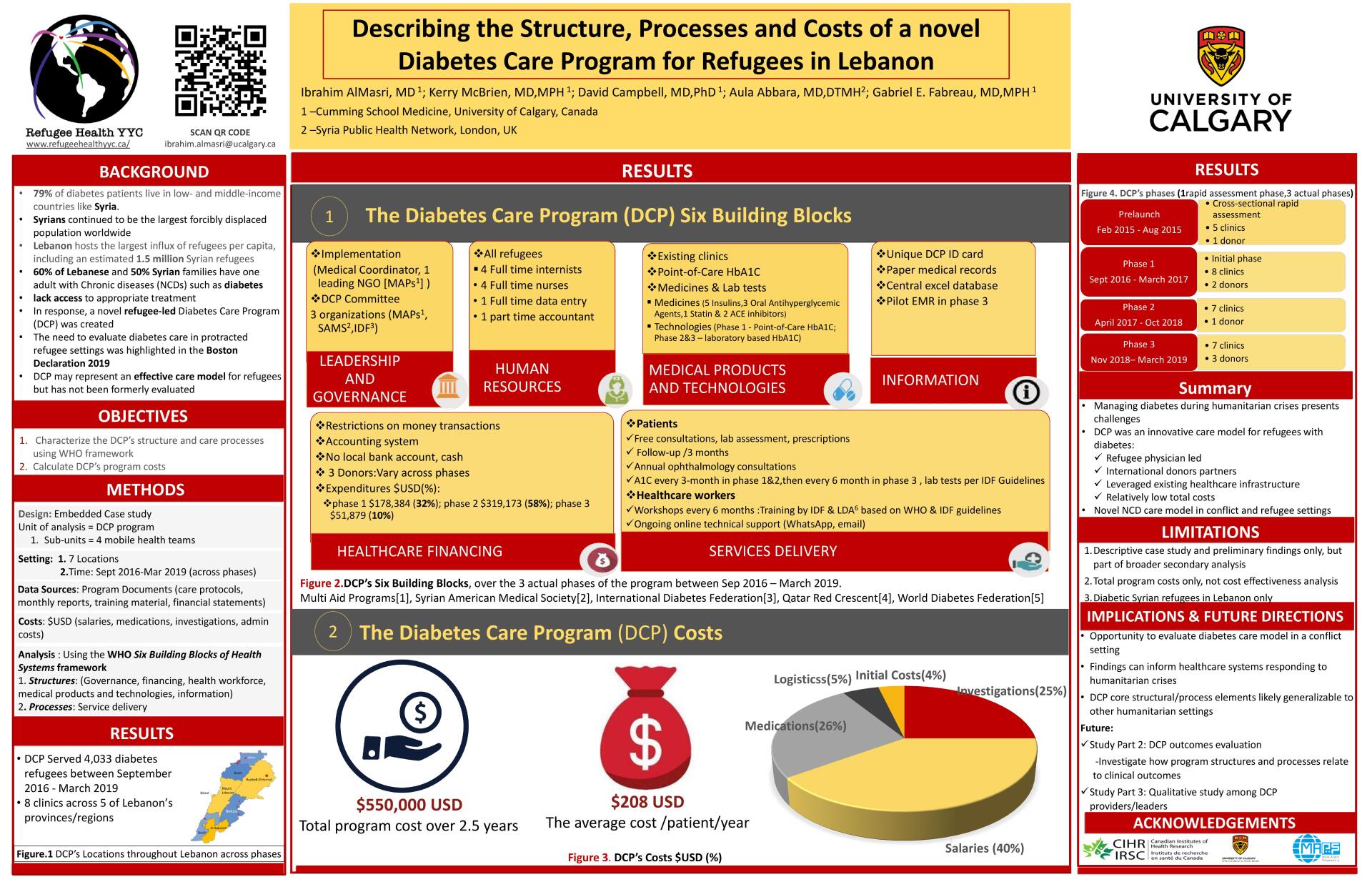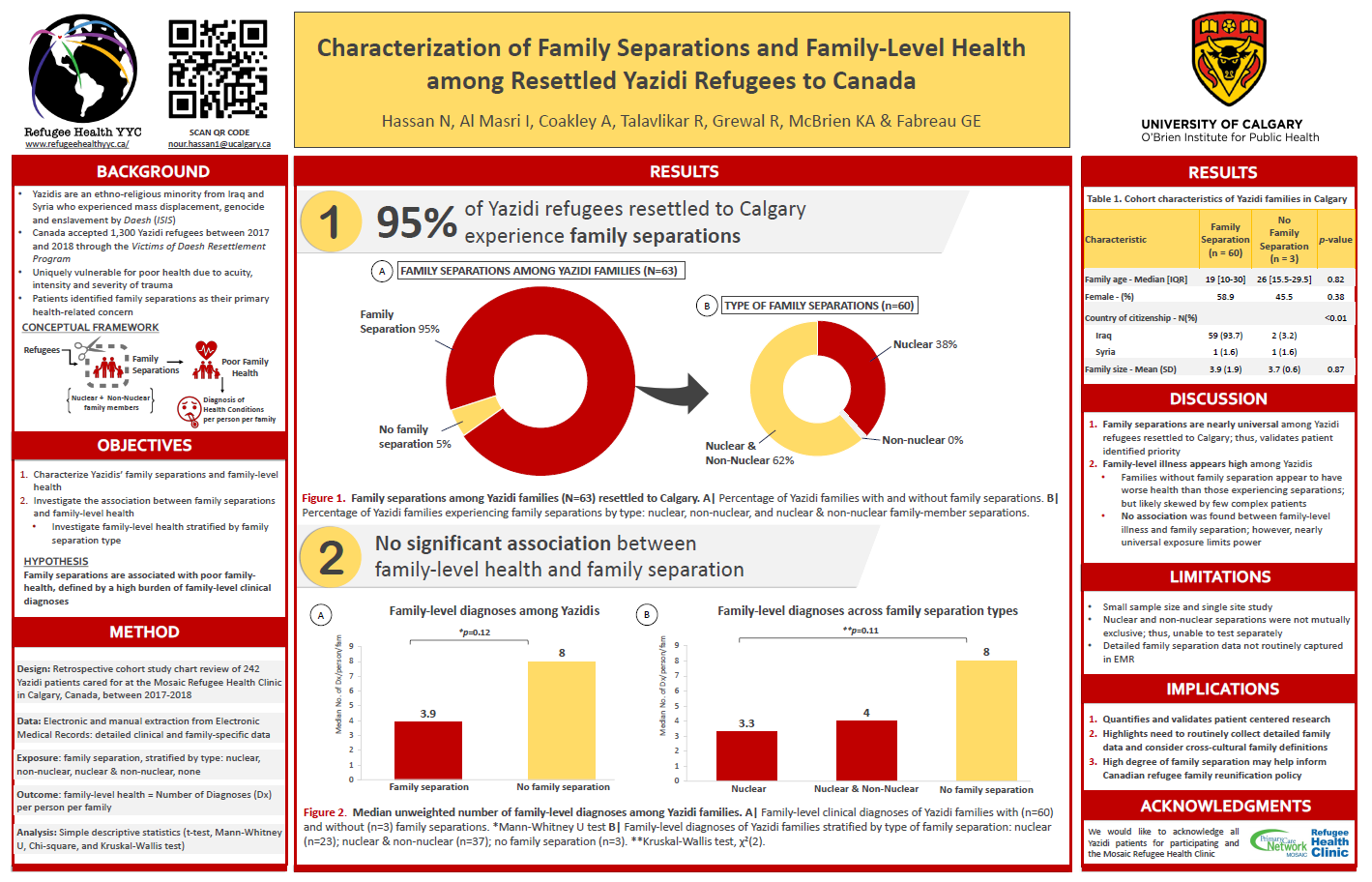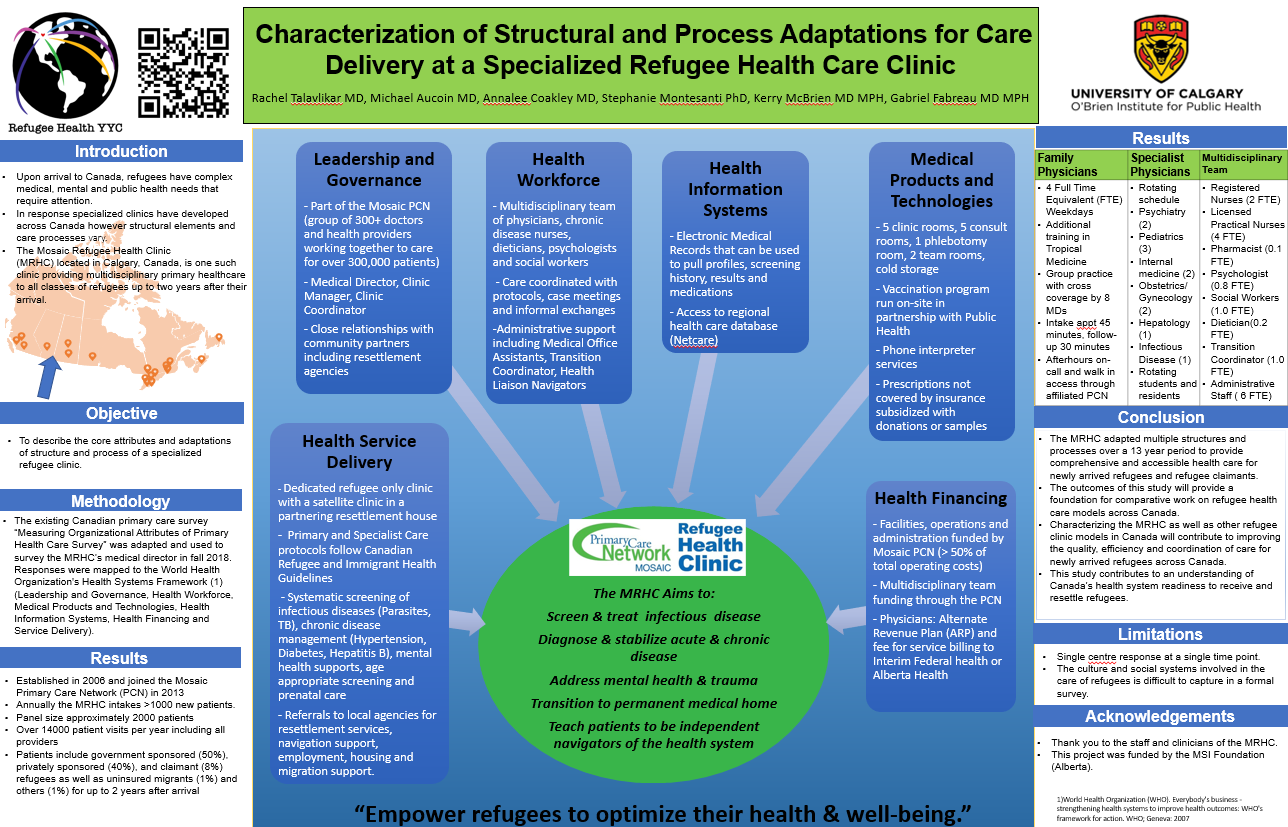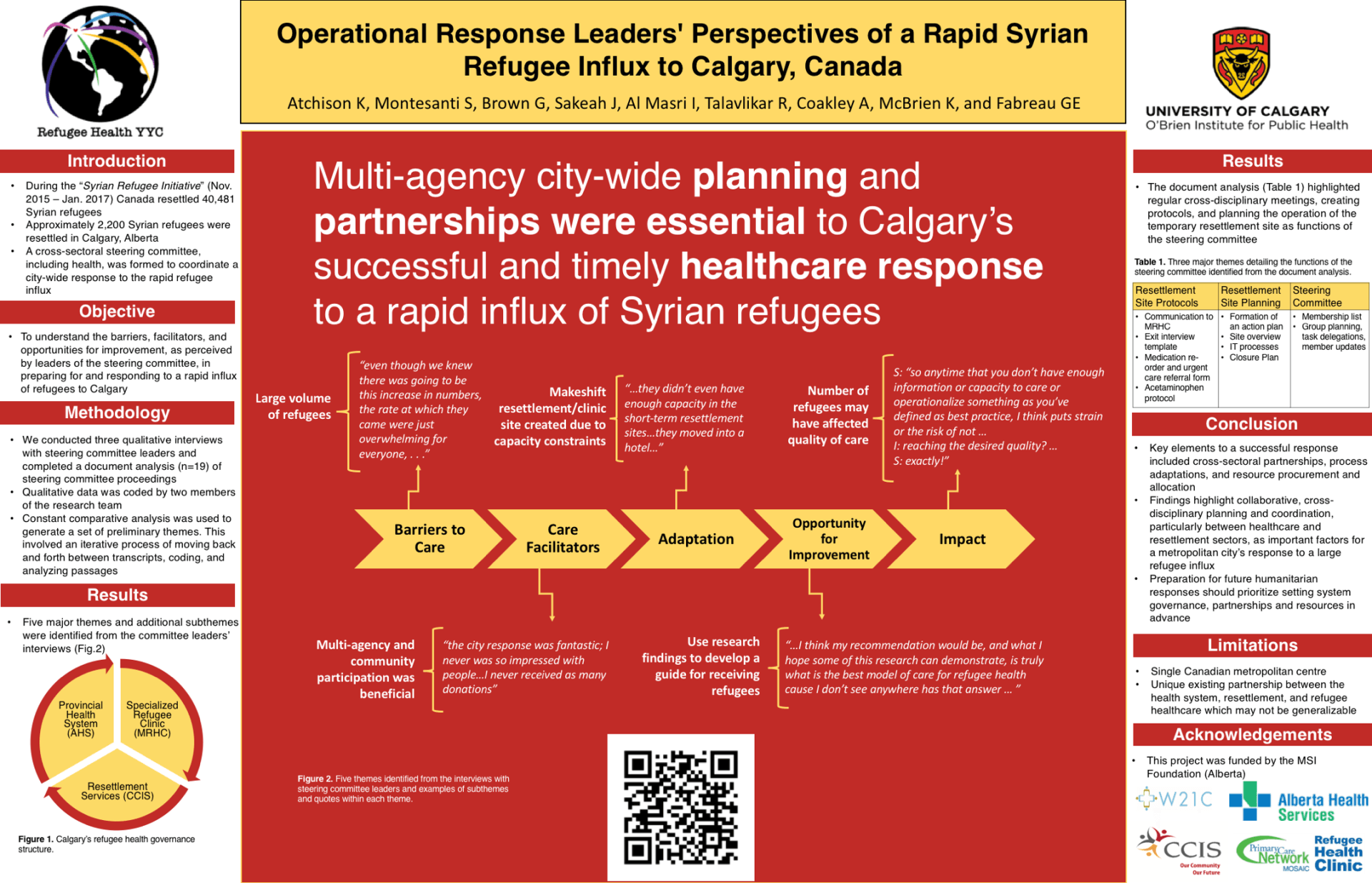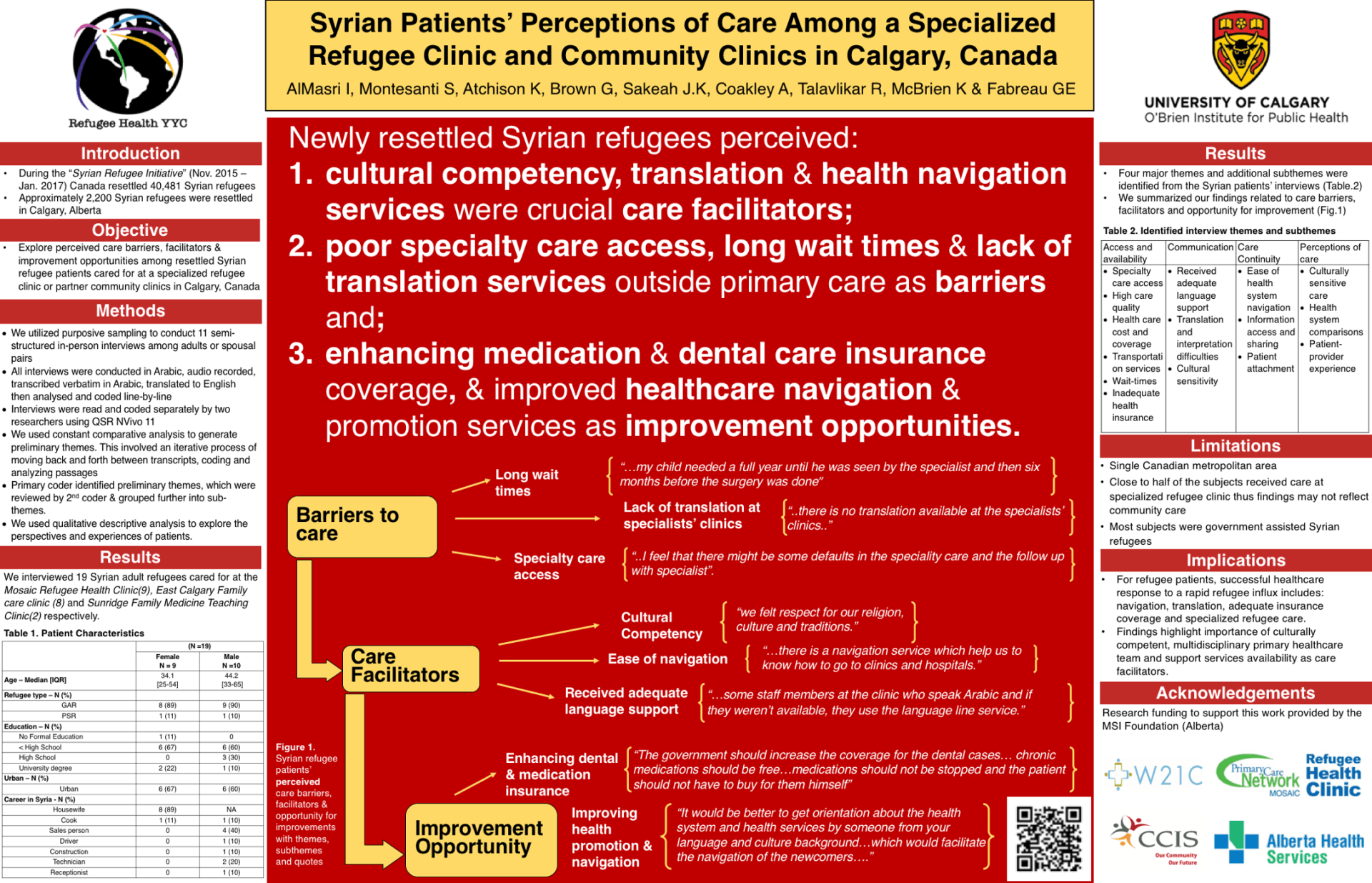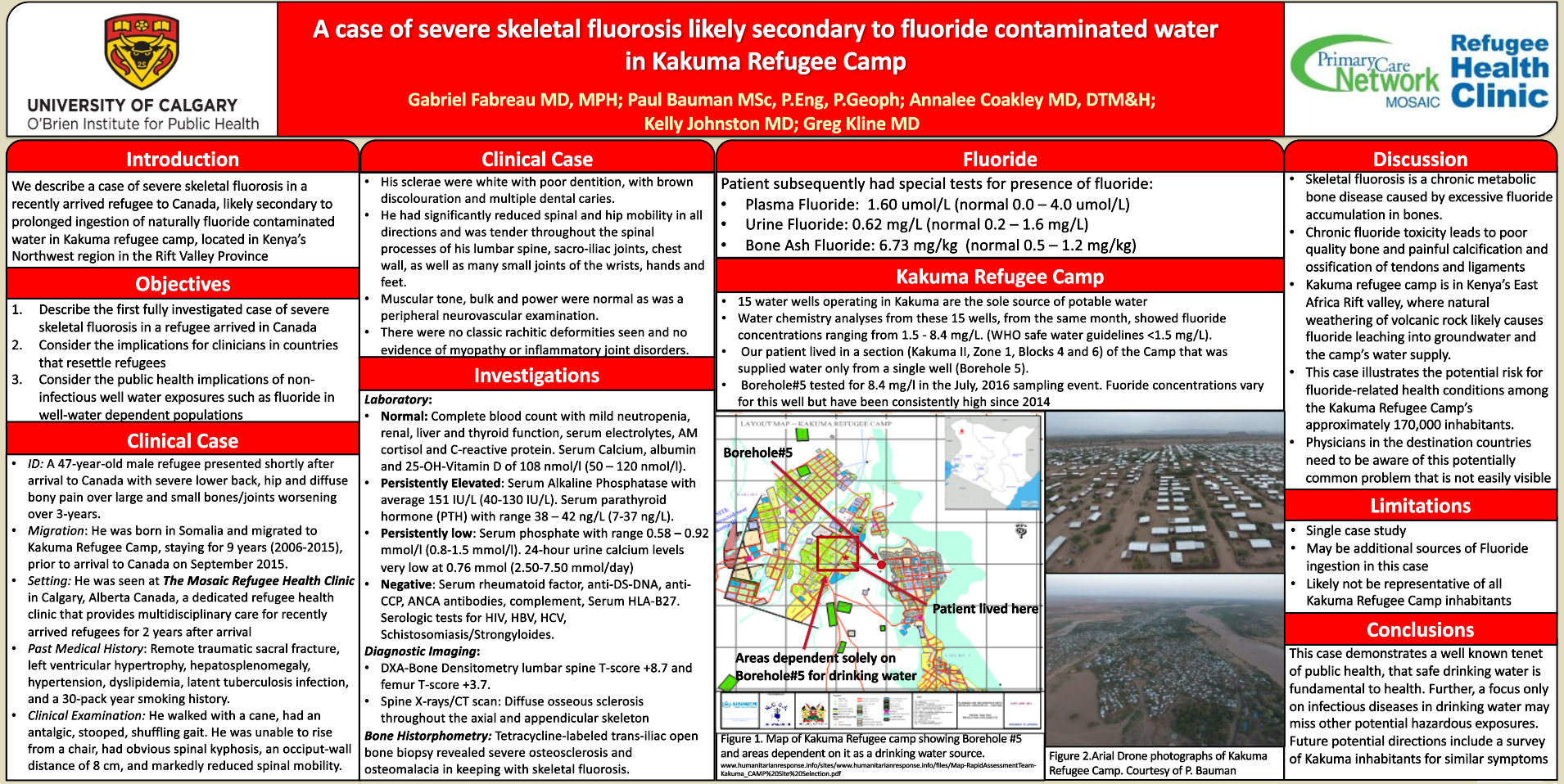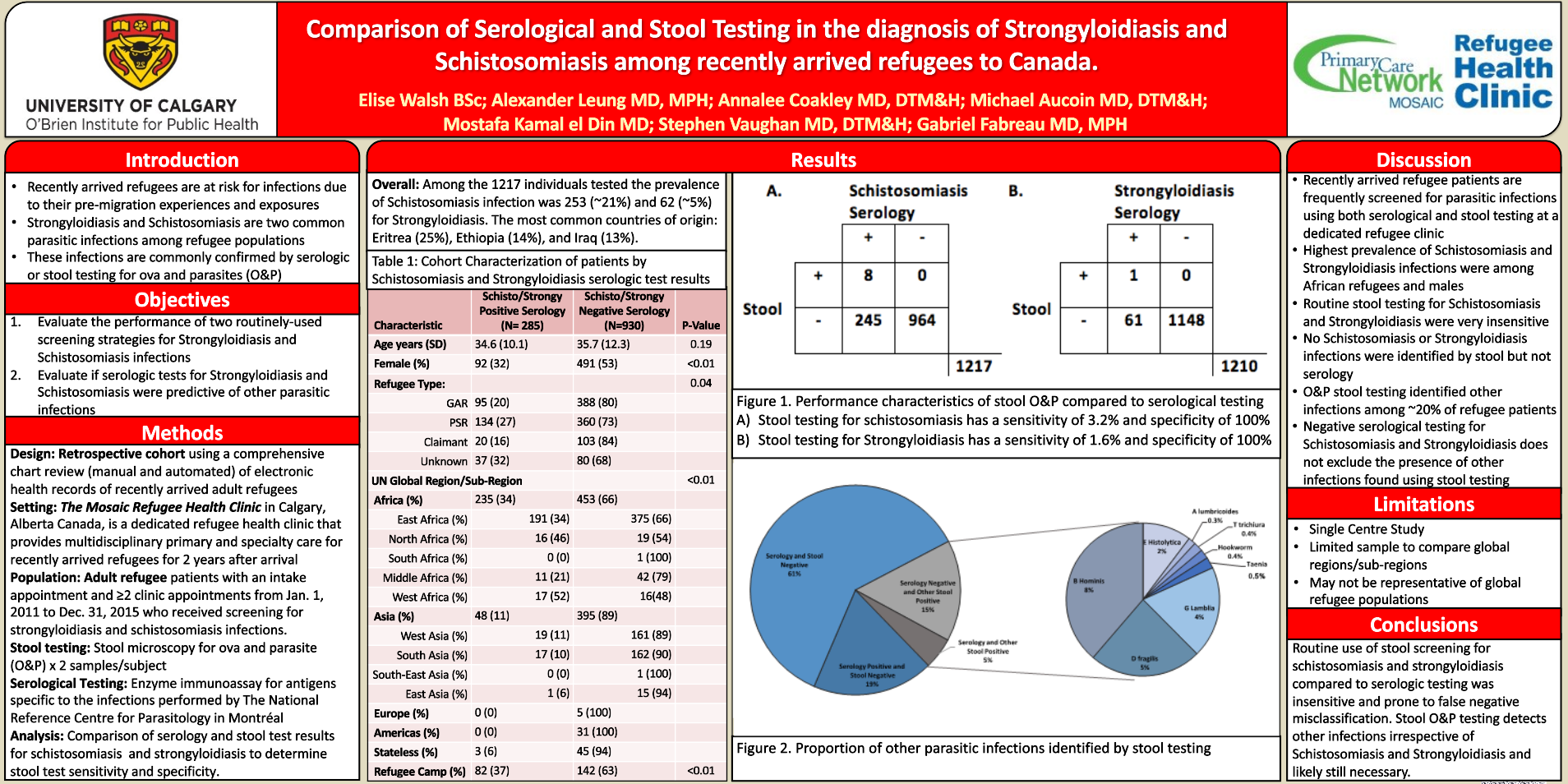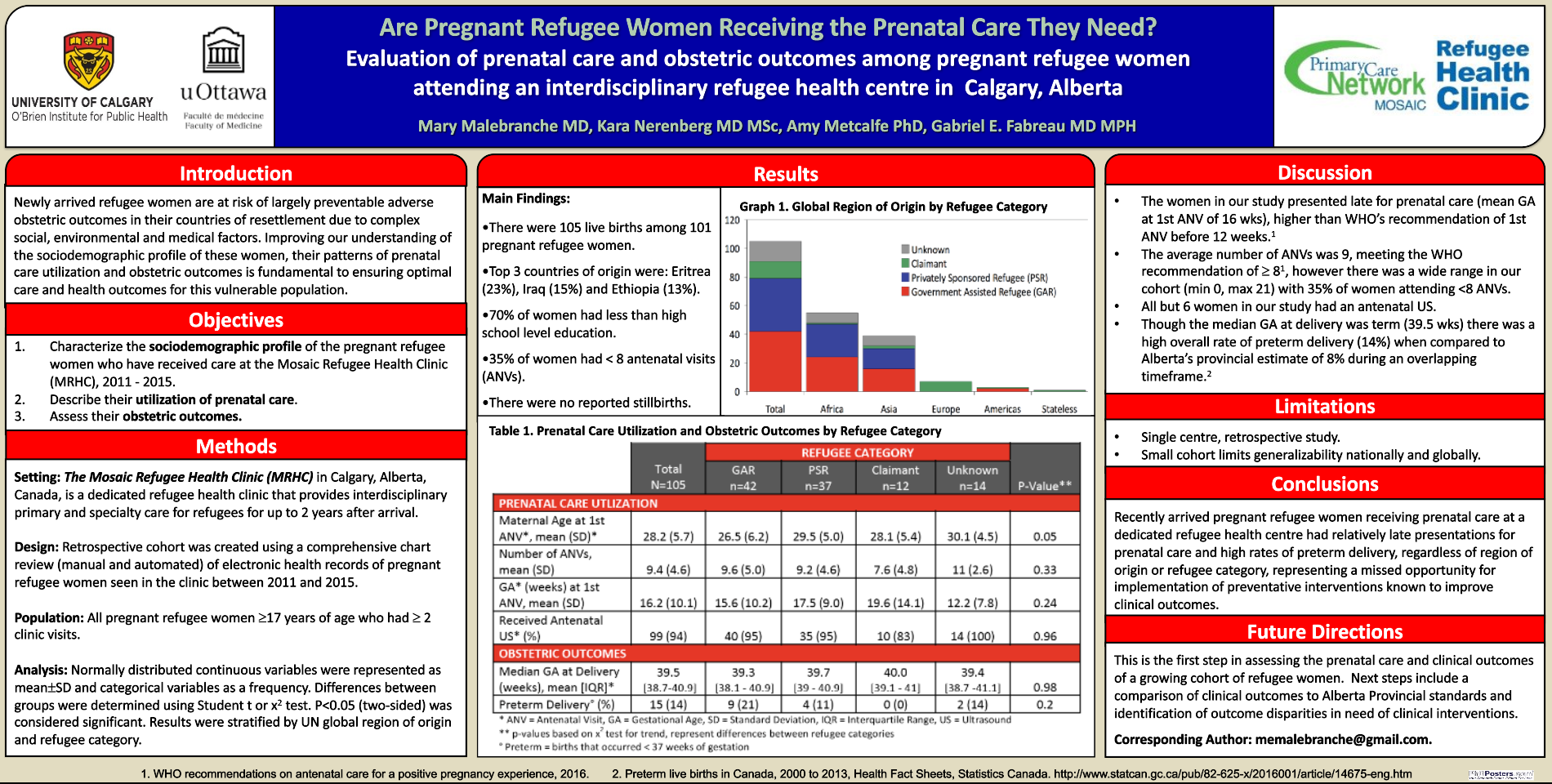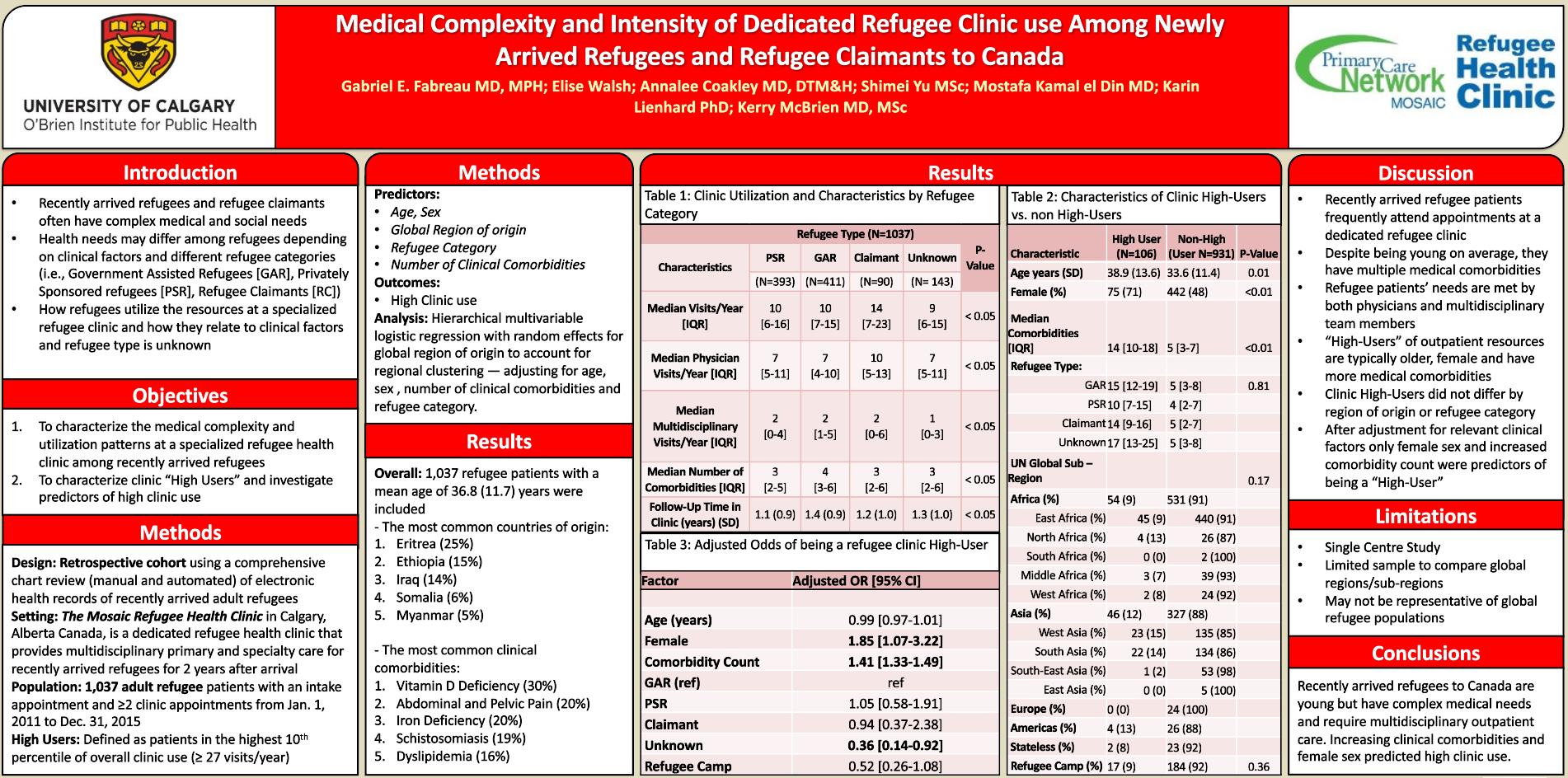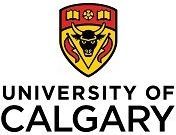

2023
The health equity impacts of COVID-19 among migrant meat processing plant workers in Alberta, Canada
Ammar Saad, Gabriel Fabreau, Linda Holdbrook, Zahra Hussain, Minnella Antonio, Michael Youssef, Mussie Yemane, Adanech Sahilie, Edna Ramirez-Cerino, Nour Hassan, Olivia Magwood, Sam Spitzer, Kevin Pottie
-
Enlarge
Button
Characterizing Canada's Refugee Healthcare System - Immunization Processes for Refugees*
* Awarded the Best Poster Presentation award at the 2023 North American Refugee Health Conference
El-Shazly N, Coakley A, Arya N, Brindamour M, Holland T, Leslie M, Musto R, Narasiah L, Pottie K, Rashid M, Redditt V, Wiedmeyer M, Fabreau GE
-
Enlarge
Button
Using Nominal Group Technique with a Diverse Refugee Patient Advisory Committee (PAC) to Identify Health and Research Priorities*
Deyana Altahsh, Linda Holdbrook, Adanech Sahilie, Eric Norrie, Rabina Grewal, Maria Santana, Rachel Talavlikar, Michael Aucoin, Annalee Coakley, Gabriel E. Fabreau
* Awarded the 2023 Collaborative Forum EDI Award at the 2023 Northwest SPOR Collaborative Forum Conference
-
Enlarge
Button
Healthcare Delivery, Research, and Policy Priorities from a Refugee Patient Advisory Council (PAC)
Linda Holdbrook, MPH; Adanech Sahilie, Eric Norrie, MSc; Rabina Grewal, Maria Santana, MD, PhD; Rachel Talavlikar, MD; Michael Aucoin, MD; Annalee Coakley, MD; Gabriel Fabreau, MD
-
Enlarge
Button
Background:
Resettled refugees are often excluded from health research, healthcare delivery, and policy decisions. We partnered with refugee patient advisors at a specialized refugee healthcare clinic in a Canadian urban center, to create an inclusive platform for refugees to identify and prioritize health research needs.
Methods: We assembled a diverse cohort of 7 refugees across various resettlement stages and refugee categories and conducted the first of five focus groups using nominal group technique (NGT). Sociodemographic data were collected with a standardized survey. We used descriptive statistics to summarize survey data, analyzed focus group results using thematic analysis, and ranked research priorities using the NGT consensus-based framework.
Results: The 7 PAC members arrived in Canada between 2005 and 2022, from countries in the African Region (n=3), Eastern Mediterranean Region (n=3), and European Region (n=1). They represented various immigration categories including Government Assisted Refugee (n=2), Temporary Foreign Worker (n=1), Permanent Resident (n=2), and Canadian Citizen (n=2). Over half of the participants were women (n=4), and their ages ranged from 22-61 years. PAC members developed a ranked list of research priorities, which identified mental health supports and services as the top research need, followed by culturally sensitive nutritional education, interpretation services, improved explanation of doctor-patient confidentiality, and improved communication between care providers.
Conclusion: Refugee patient advisors identified and prioritized individual and systemic refugee health needs, and healthcare delivery gaps, to inform future refugee health research. Centering refugee patients’ perspectives in research is critical to better align research goals with the needs of refugees.
Community Participatory Research of racialized meat plant workers during the COVID-19 pandemic
Minnella Antonio, Edna Ramirez Cerino, Linda Holdbrook, Michael Youssef, Adanech Sahilie, Mussie Yemane, Eric Norrie, Nour Hassan, Zahra Hussain, Olivia Magwood, Ammar Saad, Maria Santana, Ingrid Nielssen, Annalee Coakley, Denise Spitzer, Gabriel E. Fabreau, Kevin Pottie
-
Enlarge
Button
Background: Across high-income countries, migrant workers in meat processing industries have experienced large COVID-19 outbreaks, leading to community spread and worker deaths.
Methods: We used community based participatory research methods to identify, train and integrate six community scholars representing six racialized ethnocultural minorities from Africa, Latin American, and Southeast Asia. We present an organizational case study of their lived experiences in research, and operationally in public health outreach, across 11 meat plants in western Canada: including false starts, failures, and successes. We used operational documents to summarize the project setting: training, roles, and evolution across public health research and operations. Community scholars used reflexivity exercises to detail their experiences, and the durable impacts of COVID-19 vaccine outreach on themselves, migrant workers, and their communities. We used narrative analysis to summarize the community scholars’ reflections including the context, COVID-19-related obstacles, resolution, and key learnings.
Results: The community scholars summarized their outreach strategies, the personal attributes that contributed to success in this role, and the learned skills and durable impacts of their work as co-researchers. They identified key learnings from their experiences which included 1) Validation of experiences and empathetic listening; 2) Translation of stories into advocacy; and 3) Maintaining a community presence in the face of uncertainties.
Conclusion: Community-academic-healthcare partnerships can rapidly hire community leaders, integrate research training, and implement and iteratively refine multicultural community-based participatory methods critical to research and public health outreach efforts amidst precarious pandemic conditions during a public health crisis.
What Are the Experiences of Newcomers Accessing COVID-19 Vaccine Information and COVID-19 Vaccines in Alberta During the COVID-19 Pandemic?
Minnella Antonio, Edna Ramirez-Cerino, Adanech Sahilie, Mussie Yemane, Michael Youssef, Ingrid Nielssen, Linda Holdbrook, Maria Santana, Denise Spitzer, Kevin Pottie, Gabriel E. Fabreau
-
Enlarge
Button
Background: Despite COVID-19 vaccines and vaccine information being freely available for refugees and other newcomers in Alberta, they have faced significant vaccine inequity. As a group of researchers from different ethnic backgrounds, language, and cultural competencies, we aimed to understand the lived experience of newcomers accessing COVID-19 vaccine and COVID-19 vaccine information.
Methods: We conducted a prospective community-based-participatory qualitative study with self-identified refugees and newcomers in Calgary, Alberta. Community Scholars, representing various ethnocultural communities conducted semi-structured interviews and focus groups with participants in English and first language. We also collected sociodemographic data with a standardized survey. We used the Patient and Community Engagement Research (PaCER) framework to conduct a thematic analysis of the data obtained.
Results: We conducted two focus groups and five semi-structured interviews with 12 participants, 50% who identified as female. Participants’ self-identified countries of origin included the Philippines, Ethiopia, Eritrea Mexico, Burundi, and Egypt. We identified three main themes, each with two subthemes: (1) vaccine hesitancy due to lack of reliable information and religious and cultural beliefs, (2) access to COVID-19 vaccines and information, and (3) vaccine acceptance as voluntary or coerced.
Conclusion: Our findings suggest that newcomer communities were overlooked during the population-wide COVID-19 vaccination program. This community-engaged study amplifies newcomers' voices who faced inequitable access to vaccine and information access. These findings can help inform their inclusion in future population-wide public health and healthcare policies.
2022
2021
2020
Describing the Structure Processes and Costs of a Novel Diabetes Care Program for Refugees in Lebanon
2nd Annual Symposium on Diabetes in Humanitarian Crises - Virtual Conference
Al Masri I, McBrien KA, Campbell D, Abbara A, Fabreau GE
December 10, 2020
-
Enlarge
Button
Characterization of Family Separations and Family-Level Health among Resettled Yazidi Refugees to Canada
Hassan N, Al Masri I, Coakley A, Talavlikar R, Grewal R, McBrien KA & Fabreau GE
September 2020
2020 North American Refugee Health Conference - Virtual Conference
-
Enlarge
Button
Characterization of Structural and Process Adaptations for Care Delivery at a Specialized Refugee Health Clinic
Talavlikar R, Aucoin M, Coakley A, Montesanti S, McBrien KA, Fabreau GE
September 2020
2020 North American Refugee Health Conference - Virtual Conference
-
Enlarge
Button
Characterization of Structural and Process Adaptations for Care Delivery at a Specialized Refugee Health Clinic
2020 North American Refugee Health Conference - Virtual Conference
Talavlikar R, Aucoin M, Coakley A, Montesanti S, McBrien KA, Fabreau GE
September 2020
-
Enlarge
Button
2019
Operational response leaders' perspectives of a rapid Syrian refugee influx to Calgary, Canada
Atchison K, Brown G, Sakeah J, AlMasri I, Tavalikar R, Coakley A, McBrien K, Montesanti S, Fabreau GE
June 2019
2019 North American Refugee Health Conference
-
Enlarge
Button
Background: Between November 2015 and January 2017 Canada resettled 40,081 Syrian refugees through the “Syrian Refugee Initiative”, which required a rapid healthcare and resettlement services response. Approximately 2,200 refugees resettled in Calgary, where a cross-sectoral steering committee coordinated a city-wide response, including healthcare. We aimed to understand the influx's impact on refugee patients, providers, and the local primary healthcare system and how the steering committee prepared for and responded to it.
Methods: As part of a larger Calgary-based case study, we interviewed three steering committee leaders who coordinated Calgary’s healthcare and resettlement response. We also collected nineteen steering committee documents describing the city’s planning and response. We used inductive thematic analysis of interview transcripts and documents to identify major themes. Themes were then mapped to our “patient, provider, health system” conceptual framework.
Results: We identified healthcare challenges including: large volume and high healthcare needs of arrived refugees, management of refugees’ expectations, and competing needs between healthcare and resettlement services. Care facilitators included: support from responsive, self-motivated teams, community partnerships, and integrated health and resettlement services co-delivery. Workflow and healthcare adaptations were developed, and the impact of increased workload on healthcare providers documented. A refugee-specific needs-triage process, healthcare delivery model and enhanced resource planning were identified as improvement opportunities. Key response elements included cross-sectoral partnerships, process adaptations, and resource procurement and allocation.
Conclusions and Discussion: Our findings highlight collaborative, cross-disciplinary planning and coordination, particularly between healthcare and resettlement sectors, as important factors for a metropolitan city’s response to a large refugee infl
Syrian patients’ Perceptions of Care Among a Specialized Refugee Clinic and Community Clinics in Calgary, Canada
Almasri I, Atchison K, Brown G, Sakeah J.K, Montesanti S, McBrien K, Coakley A, Talavlikar R., Fabreau GE
June 2019
2019 North American Refugee Health Conference
-
Enlarge
Button
Background: From November 2015 to January 2017, 40,481 Syrian refugees were rapidly resettled to Canada through the “Syrian Refugee Initiative”, increasing demands on local primary healthcare clinics. We explored care perspectives among resettled Syrian refugee patients who received care at either a specialized refugee clinic or partner community clinics in Calgary, Canada.
Methods: We conducted an exploratory descriptive qualitative analysis among 19 adults Syrian refugees who arrived in Calgary, Canada during the Syrian Refugee Initiative and received care either one specialized refugee clinic or two partner primary care clinics. We conducted eleven semi-structured interviews with individual adults or spousal pairs, to explore perceived barriers and facilitators to receiving care, and perceived opportunities for healthcare delivery improvements.
Results: All patients reported receiving high quality healthcare, facilitated communication, health navigation assistance and cultural competency as care facilitators, especially among primary care clinics. Participants also perceived integrated care between primary care providers and embedded multidisciplinary care teams within primary care clinics as a particularly important care facilitator. Major perceived care barriers, particularly among specialty care included: communication difficulties, long wait-times and inadequate health insurance coverage. Perceived opportunities for improvement included adequate insurance coverage for dental care and prescription medications, as well as improved health navigation and promotion services. Among patients who received care at a specialized refugee clinic.
Conclusion: Recently resettled Syrian refugee patients identified integrated, team-based and culturally competent primary healthcare, with translation and health navigation services as optimal care factors. However, perceived challenges accessing and receiving specialty care and dental care as well as insufficient prescription medication insurance coverage.
2018
2017
A case of severe skeletal fluorosis likely secondary to fluoride contaminated water in Kakuma Refugee Camp
2017 North American Refugee Health Conference
Fabreau GE, Bauman P, Coakley A, Johnson K, Kline G
June 2017
-
Enlarge
Button
Comparison of Serological and Stool Testing in the diagnosis of Strongyloidiasis and Schistosomiasis among recently arrived refugees to Canada
Walsh E, Leung A, Coakley A, Aucoin M, Vaughan S, Fabreau GE
June 2017
2017 North American Refugee Health Conference
-
Enlarge
Button
Are Pregnant Refugee Women Receiving the Prenatal Care They Need?
Malebranche M, Nerenberg K, Metcalfe A, Fabreau GE
June 2017
2017 North American Refugee Health Conference
-
Enlarge
Button
Hypertension Prevalence, Treatment, and Control at a Specialized Refugee Clinic In Calgary, Alberta, Canada
2017 North American Refugee Health Conference
Norrie E, Leung A, McBrien K, Coakley A, Fabreau GE
June 2017
-
Enlarge
Button
2016
Medical complexity and intensity of dedicated refugee clinic use among newly arrived refugees and refugee claimants to Canada
2016 North American Refugee Health Conference
Fabreau GE, Walsh E, Coakley A, Yu S, Kamal el Din M, Lienhard K and McBrien K
June 2016
-
Enlarge
Button

